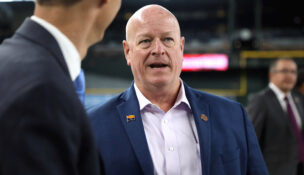Graf, Giffords face off for Kolbe’s congressional seat
Arizona Capitol Reports Staff//September 15, 2006//[read_meter]
Graf, Giffords face off for Kolbe’s congressional seat
Arizona Capitol Reports Staff//September 15, 2006//[read_meter]

Fair fight
Former Arizona lawmakers Gabrielle Giffords and Randy Graf will now face off in what is expected to be one of the most expensive, hardest-fought races in the country in 2006.
The Republican scramble to replace retiring Rep. Jim Kolbe roared to a close Sept. 12 in a closely fought primary battle ultimately won by former state Rep. Randy Graf.
Mr. Graf defeated state Rep. Steve Huffman by at least 6 percentage points and former state Republican Party Chairman Mike Hellon finished a distant third.
The race for one of the country’s most closely contested seats was unusual, given the involvement of the National Republican Congressional Committee in the Republican primary on behalf of Mr. Huffman. Perhaps more unusual, and possibly more decisive in the outcome was the role the Democratic Congressional Campaign Committee and the Arizona Democratic Party played in the same GOP primary.
The NRCC spent more than $120,000 propping up Mr. Huffman while attacking Mr. Graf, widely seen as the more conservative candidate in the race. The DCCC and Arizona Democrats, on the other hand, fought back with ads critical of Mr. Huffman for missing important immigration votes in the state Legislature.
Some district residents reported receiving as many as five mail pieces paid for by Democrats attacking Mr. Huffman, and automated calls were reported on Election Day. One veteran Republican operative claimed to receive 15 phone calls over the last week of the primary. “I’ve never been plagued by that many,” the operative said.
All told, the Democratic groups outspent Republicans, dumping more than $290,000 into attacks against Mr. Huffman.
But while he won the race because of the NRCC attack ads, Mr. Graf emerges from the primary in a weakened state, say some political watchers. That’s not what Republicans need in a district that has trended more Democratic in recent years.
Privately, Republican strategists worry that the divisive primary may seriously hurt Mr. Graf’s chances at retaining the seat for Republicans. “There are going to be some big wounds to heal,” said one veteran Republican operative, speaking on condition of anonymity.
Party rift
“It’s going to take a lot of time” to mend the intra-party rift, according to one elected official who backed Mr. Graf in the primary. The official, worried that the fight could hurt Mr. Graf in the general election, said “The healing process might have to be scooted along a little bit.”
That healing process was delayed Sept. 13 when Mr. Kolbe released a statement congratulating Mr. Graf on his victory but refusing to endorse his fellow Republican. In the statement, Mr. Kolbe said that because of “profound and fundamental” differences between himself and Mr. Graf, “I would not be true to my own principles were I to endorse [Graf] now for the general election.” Mr. Kolbe had endorsed Mr. Huffman in the primary.
Bad feelings extend beyond district boundaries, though. One Washington D.C.-based political operative working to help Democrats retake the House points out that Mr. Graf and the NRCC “have to have a bad relationship.” Mr. Graf may resist advice from the national party, and that could cause strategic problems, the Democrat suggested.
The veteran Republican operative based in the district agrees with the sentiment, and thinks the NRCC stepped over the line. “I didn’t know what [the NRCC’s] logic was, but I thought it was stupid.”
Democratic primary just as nasty
The Democratic primary, while producing a more clear-cut result, offered its share of divisiveness as well. Just before 10 p.m., former television news anchor Patty Weiss conceded defeat to former state Senator Gabrielle Giffords. Ms. Giffords took 54 percent of the Democratic vote Ms. Weiss’ 31 percent, while four other candidates split the remaining 15 percent.
While Ms. Weiss enjoyed an early lead in name recognition thanks to her years on Tucson television, Ms. Giffords raised more than $1.1 million. Ms. Giffords’ warchest enabled the campaign to run five television ads. “She just overwhelmed Patty Weiss with money,” said one longtime Democratic Party leader.
Unlike the Republican primary, however, divisions among Democrats healed quickly, as Ms. Weiss joined Ms. Giffords at Ms. Giffords’ victory party at Tucson’s Viscount Suites to concede.
The candidates, along with state Democratic Chairman David Waid, held a unity rally Sept. 14 at the same hotel, where Ms. Weiss and other former Democratic candidates pledged to support Ms. Giffords.
Ms. Giffords and Mr. Graf will now face off in what is expected to be one of the most expensive, hardest-fought races in the country in 2006. The DCCC has already reserved time on the district’s television stations for independent expenditures on Ms. Giffords’ behalf. The NRCC did not comment on possible advertising buys.
While some think Mr. Graf and the NRCC will each be hurt by strained relations, NRCC spokesperson Jonathan Collegio asserted that isn’t the case. “Know that the NRCC is 100 percent behind Randy Graf,” he said.
Mr. Collegio previewed the NRCC’s case against Ms. Giffords, saying the campaign would be about tax relief and border security. “Arizona voters will see a very clear contrast between Randy Graf, who is right on both issues, and Gabby Giffords, who had to run leftward on both to win a Democratic primary.”
Democrats tipped their hand as well. “Randy Graf wants to end the Medicare program that millions of Arizona seniors depend upon. Enough said,” declared DCCC spokesperson Sarah Feinberg.
The seat remains at the top of many political experts’ lists of most competitive House races in the nation, thanks to its slight Republican lean in a strong Democratic year. With both the DCCC and the NRCC actively involved, the Giffords-Graf match-up in November promises to make both primaries seem tame by comparison.

















